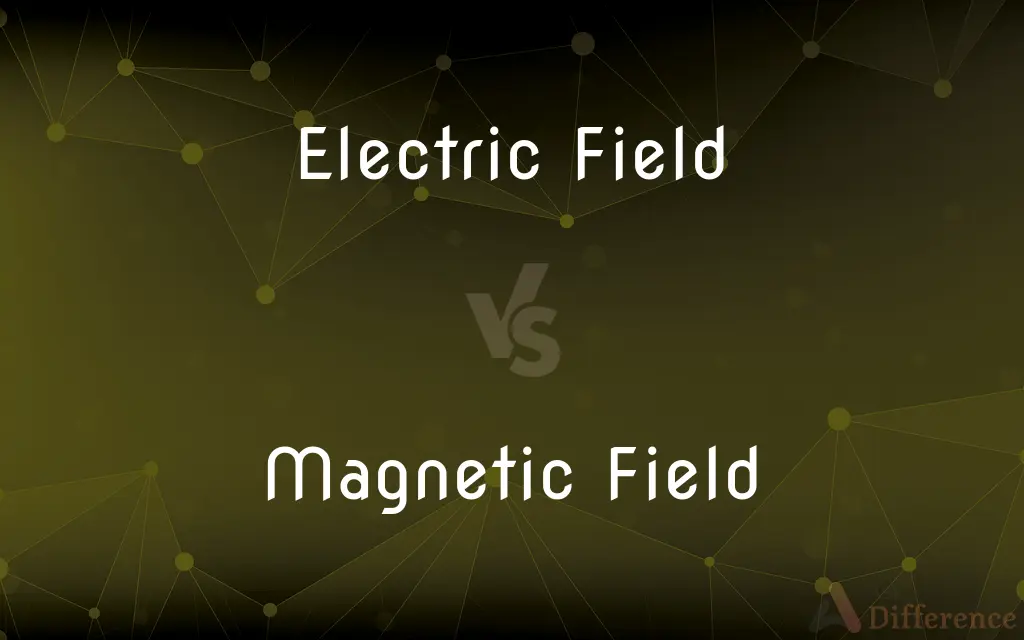Electric Field vs. Magnetic Field — What's the Difference?
Edited by Tayyaba Rehman — By Fiza Rafique — Published on November 19, 2023
Electric Fields arise from electric charges and act on other charges; Magnetic Fields originate from moving charges and affect magnetic materials.

Difference Between Electric Field and Magnetic Field
Table of Contents
ADVERTISEMENT
Key Differences
An Electric Field is a region in space where electric charges experience a force. In contrast, a Magnetic Field is where magnetic poles or moving electric charges feel a force. Both fields are essential components of electromagnetic forces, one of the fundamental forces in nature.
Electric Fields are generated by electric charges, whether stationary or in motion. On the other hand, Magnetic Fields are primarily produced by moving electric charges, such as currents in a wire.
The strength and direction of an Electric Field determine the force exerted on other electric charges present. Conversely, the force exerted by a Magnetic Field will influence other magnetic poles or moving charges within its range.
Instruments such as the electroscope can detect Electric Fields, showcasing the force acting on test charges. In contrast, Magnetic Fields can be observed using compass needles, which align themselves along the field lines.
While both Electric and Magnetic Fields can exist independently, when they change with respect to time, they can give rise to each other, leading to electromagnetic waves. This interplay is described by Maxwell's equations, a set of laws foundational to understanding electromagnetism.
ADVERTISEMENT
Comparison Chart
Origin
Electric charges.
Moving electric charges.
Force Acts On
Electric charges.
Magnetic poles or moving electric charges.
Detection
Electroscope.
Compass.
Relation to Electromagnetism
One component of electromagnetic force.
Other component of electromagnetic force.
Field Lines
Begin and end on charges.
Form closed loops, don't start or end.
Compare with Definitions
Electric Field
A region around a charged particle where an electric force is exerted.
The Electric Field around the charged rod caused the nearby paper bits to move.
Magnetic Field
A field arising from magnetized materials or changing electric fields.
The coil's changing current produced a varying Magnetic Field.
Electric Field
A vector field representing the force experienced by a positive test charge.
The strength of the Electric Field is measured in volts per meter.
Magnetic Field
An entity describing the magnetic force per unit charge velocity.
Instruments like the magnetometer measure the strength and direction of the Magnetic Field.
Electric Field
A field resulting from static charges or varying magnetic fields.
The Electric Field between the plates of the capacitor stored energy.
Magnetic Field
A field generated by moving electric charges.
The Magnetic Field around the wire caused the compass needle to deflect.
Electric Field
The space where a stationary charge influences other charges.
When he approached the charge, he could sense the Electric Field's effect.
Magnetic Field
A vector field indicating the magnetic influence on moving charges.
Earth's Magnetic Field protects us from solar radiation.
Electric Field
An entity describing the electric force per unit charge.
The Electric Field direction is always taken from positive to negative charges.
Magnetic Field
The space where magnets or currents exert forces on other magnetic materials.
The Magnetic Field of the MRI machine was strong enough to pull metal objects.
Common Curiosities
Is the Electric Field strength uniform around a charge?
No, Electric Field strength typically varies with distance from the charge.
How is Earth's Magnetic Field generated?
Earth's Magnetic Field is primarily generated by the movement of molten iron within its outer core.
What generates an Electric Field?
An Electric Field is generated by electric charges.
Can Electric Fields exist without charges?
No, Electric Fields are produced by electric charges.
What unit measures Electric Field strength?
Electric Field strength is measured in volts per meter (V/m).
How does a Magnetic Field differ from an Electric Field?
A Magnetic Field originates from moving electric charges, while an Electric Field arises from stationary or moving charges.
Can moving charges create both Electric and Magnetic Fields?
Yes, moving charges can produce both Electric and Magnetic Fields.
How does a changing Magnetic Field affect an Electric Field?
A changing Magnetic Field can induce an Electric Field, as described by Faraday's law of electromagnetic induction.
How do Electric and Magnetic Fields interact in light?
In electromagnetic waves, like light, changing Electric Fields produce Magnetic Fields and vice versa, allowing the wave to propagate.
How can you visualize a Magnetic Field?
A Magnetic Field can be visualized using field lines, often displayed with iron filings around a magnet.
Are Magnetic Fields always circular?
Magnetic Field lines around a straight current-carrying wire are circular, but the shape can vary based on the current's path and magnet's shape.
Can you shield from Magnetic Fields?
Yes, certain materials like mu-metal can shield areas from external Magnetic Fields.
Is the Electric Field inside a conductor zero?
Yes, in electrostatic conditions, the Electric Field inside a conductor is zero.
Can magnets produce Electric Fields?
Moving magnets, or changing Magnetic Fields, can produce Electric Fields.
Are Electric and Magnetic Fields related to each other?
Yes, changing Electric Fields can produce Magnetic Fields and vice versa, as described by Maxwell's equations.
Share Your Discovery

Previous Comparison
Tungsten Carbide vs. Boron Carbide
Next Comparison
C7 Christmas Lights vs. C9 Christmas LightsAuthor Spotlight
Written by
Fiza RafiqueFiza Rafique is a skilled content writer at AskDifference.com, where she meticulously refines and enhances written pieces. Drawing from her vast editorial expertise, Fiza ensures clarity, accuracy, and precision in every article. Passionate about language, she continually seeks to elevate the quality of content for readers worldwide.
Edited by
Tayyaba RehmanTayyaba Rehman is a distinguished writer, currently serving as a primary contributor to askdifference.com. As a researcher in semantics and etymology, Tayyaba's passion for the complexity of languages and their distinctions has found a perfect home on the platform. Tayyaba delves into the intricacies of language, distinguishing between commonly confused words and phrases, thereby providing clarity for readers worldwide.












































